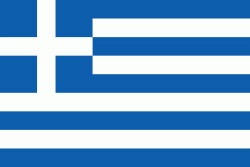Samos International Airport (Samos Aristarchos International Airport)
Samos International Airport (also known as Aristarchos) is an airport on Samos Island, Greece.
The airport is named after Aristarchos of Samos, an ancient astronomer and mathematician, and lies within 5 km from the nearby town of Pythagorio. The airport features a single short runway serving both arrivals and departures. The airports surroundings leave little room for error or mistake on the behalf of the pilots – with nearby mountains and sea at the end of the short runway. There are often strong Meltemi winds blowing from the north during the summer months which further contribute to the difficulty of the landing. There is only one terminal in the airport. There are five boarding gates, none of which have jet-bridges. Passenger facilities are split across two floors and include a duty-free shop and a small café.
The airport first operated in May 1976 and during the late 1990s/early 2000s, the terminal was renovated – the capacity of the airport was increased to deal with increasing passenger numbers and the terminal was renovated.
In December 2015, the privatisation of Samos International Airport and 13 other regional airports of Greece was finalised with the signing of the agreement between the Fraport AG/Copelouzos Group joint venture and the state privatisation fund. "We signed the deal today," the head of Greece's privatisation agency HRADF, Stergios Pitsiorlas, told Reuters. According to the agreement, the joint venture will operate the 14 airports (including Samos International Airport) for 40 years as of 11 April 2017.
The airport is named after Aristarchos of Samos, an ancient astronomer and mathematician, and lies within 5 km from the nearby town of Pythagorio. The airport features a single short runway serving both arrivals and departures. The airports surroundings leave little room for error or mistake on the behalf of the pilots – with nearby mountains and sea at the end of the short runway. There are often strong Meltemi winds blowing from the north during the summer months which further contribute to the difficulty of the landing. There is only one terminal in the airport. There are five boarding gates, none of which have jet-bridges. Passenger facilities are split across two floors and include a duty-free shop and a small café.
The airport first operated in May 1976 and during the late 1990s/early 2000s, the terminal was renovated – the capacity of the airport was increased to deal with increasing passenger numbers and the terminal was renovated.
In December 2015, the privatisation of Samos International Airport and 13 other regional airports of Greece was finalised with the signing of the agreement between the Fraport AG/Copelouzos Group joint venture and the state privatisation fund. "We signed the deal today," the head of Greece's privatisation agency HRADF, Stergios Pitsiorlas, told Reuters. According to the agreement, the joint venture will operate the 14 airports (including Samos International Airport) for 40 years as of 11 April 2017.
| IATA Code | SMI | ICAO Code | LGSM | FAA Code | |
|---|---|---|---|---|---|
| Telephone | Fax | ||||
| Home page | Hyperlink |
Map - Samos International Airport (Samos Aristarchos International Airport)
Map
Country - Greece
 |
 |
| Flag of Greece | |
Greece is considered the cradle of Western civilization, being the birthplace of democracy, Western philosophy, Western literature, historiography, political science, major scientific and mathematical principles, theatre and the Olympic Games. From the eighth century BC, the Greeks were organised into various independent city-states, known as poleis (singular polis), which spanned the Mediterranean and the Black Sea. Philip II of Macedon united most of present-day Greece in the fourth century BC, with his son Alexander the Great rapidly conquering much of the ancient world, from the eastern Mediterranean to the North Western parts of India. The subsequent Hellenistic period saw the height of Greek culture and influence in antiquity. Greece was annexed by Rome in the second century BC, becoming an integral part of the Roman Empire and its continuation, the Byzantine Empire, which was culturally and linguistically predominantly Greek.
Currency / Language
| ISO | Currency | Symbol | Significant figures |
|---|---|---|---|
| EUR | Euro | € | 2 |
| ISO | Language |
|---|---|
| EN | English language |
| FR | French language |
| EL | Greek language |















